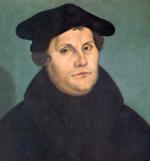Disable ads!
Martin Luther
Part of a series on Lutheranism Luther's rose Book of Concord Apostles' Creed Nicene Creed Athanasian Creed Augsburg Confession Apology of the Augsburg Confession Luther's Small / Large Catechism Smalcald Articles Treatise on the Power and Primacy of the Pope Formula of Concord Theology Justification Law and Gospel Sola gratia Sola scriptura Christology Sanctification Two kingdoms Priesthood of all believers Divine Providence Marian theology Theology of the Cross Sacramental Union Homosexuality Sacraments Rites Baptism Eucharist Confession Confirmation Matrimony Anointing of the Sick Holy Orders Organization Confessional Evangelical Lutheran Conference International Lutheran Council Lutheran World Federation Denominations Lutheranism by region History Protestant Reformation (start) Lutheran Orthodoxy Gnesio-Lutherans Pietists Haugeans Laestadians Finnish Awakening Old Lutherans Neo-Lutherans High Church Lutherans Confessional Lutherans Missionaries John Campanius Bartholomäus Ziegenbalg Hans Egede Johann Heinrich Callenberg Johann Phillip Fabricius Paul Henkel John Christian Frederick Heyer Karl Graul Martti Rautanen Wilhelm Sihler F. C. D. Wyneken Hans Paludan Smith Schreuder Lars Olsen Skrefsrud Ludwig Ingwer Nommensen Onesimos Nesib Paul Olaf Bodding Johann Flierl Christian Keyser Bible translators Martin Luther Casiodoro de Reina Kjell Magne Yri Onesimos Nesib Aster Ganno Jurij Dalmatin Kristian Osvald Viderø Jákup Dahl Bartholomäus Ziegenbalg Johann Phillip Fabricius William Tyndale John Rogers George Constantine Jozef Roháček Johannes Avetaranian Guðbrandur Þorláksson Ludvig Olsen Fossum Hans Egede / Paul Egede Otto Fabricius Nils Vibe Stockfleth Olaus Petri / Laurentius Petri Martti Rautanen Primož Trubar Jurij Dalmatin Ludwig Ingwer Nommensen Joachim Stegmann Primož Trubar Sebastian Krelj Mikael Agricola Norwegian Bible Society Samuel Ludwik Zasadius Stanislovas Rapalionis Victor Danielsen Jákup Dahl Laurentius Andreae Hans Tausen Olaf M. Norlie Jonas Bretkūnas Hans Paludan Smith Schreuder Antonio Brucioli Mikołaj Jakubica Matthias Bel Johann Ernst Glück William F. Beck Theologians Martin Luther / Katharina Luther Philipp Melanchthon Johannes Bugenhagen Johannes Brenz Justus Jonas Lucas Cranach the Elder Hans Tausen Laurentius Petri Olaus Petri Mikael Agricola Matthias Flacius Martin Chemnitz Johann Gerhard Abraham Calovius Johannes Andreas Quenstedt Johann Wilhelm Baier David Hollaz Henry Muhlenberg Lars Levi Læstadius Charles Porterfield Krauth C. F. W. Walther Dietrich Bonhoeffer Paul Tillich Lutheranism portal v t e Martin Luther, OSA, (/ˈluːθər/; German: [ˈmaɐ tiːn ˈlʊtɐ] ( listen); 10 November 1483 – 18 February 1546) was a German friar, Catholic priest, professor of theology and seminal figure of the 16th-century movement in Christianity known later as the Protestant Reformation. Initially an Augustinian friar, Luther came to reject several teachings and practices of the Roman Catholic Church. He strongly disputed the claim that freedom from God's punishment for sin could be purchased with money. He confronted indulgence salesman Johann Tetzel, a Dominican friar, with his Ninety-Five Theses in 1517. His refusal to retract all of his writings at the demand of Pope Leo X in 1520 and the Holy Roman Emperor Charles V at the Diet of Worms in 1521 resulted in his excommunication by the Pope and condemnation as an outlaw by the Emperor. Luther taught that salvation and subsequently eternity in heaven is not earned by good deeds but is received only as a free gift of God's grace through faith in Jesus Christ as redeemer from sin and subsequently eternity in Hell. His theology challenged the authority of the Pope by teaching that the Bible is the only source of divinely revealed knowledge from God and opposed sacerdotalism by considering all baptized Christians to be a holy priesthood. Those who identify with these, and all of Luther's wider teachings, are called Lutherans even though Luther insisted on Christian as the only acceptable name for individuals who professed Christ. Nowadays, Lutheranism constitutes a major branch of Protestantism and overall Christianity with some 80 million adherents. His translation of the Bible into the vernacular (instead of Latin) made it more accessible, which had a tremendous impact on the church and on German culture. It fostered the development of a standard version of the German language, added several principles to the art of translation, and influenced the writing of an English translation, the Tyndale Bible. His hymns influenced the development of singing in churches. His marriage to Katharina von Bora set a model for the practice of clerical marriage, allowing Protestant priests to marry. In his later works, notably On the Jews and Their Lies, Luther expressed antagonistic views toward Jews, writing that Jewish synagogues and homes should be destroyed, their money confiscated, and liberty curtailed. These statements and the
 Read more on wikipedia.org Read more on wikipedia.org
 All quotes by Martin Luther All quotes by Martin Luther
 Edit Edit
|

|
|
|
|
|
Background photo by Giuliana
|